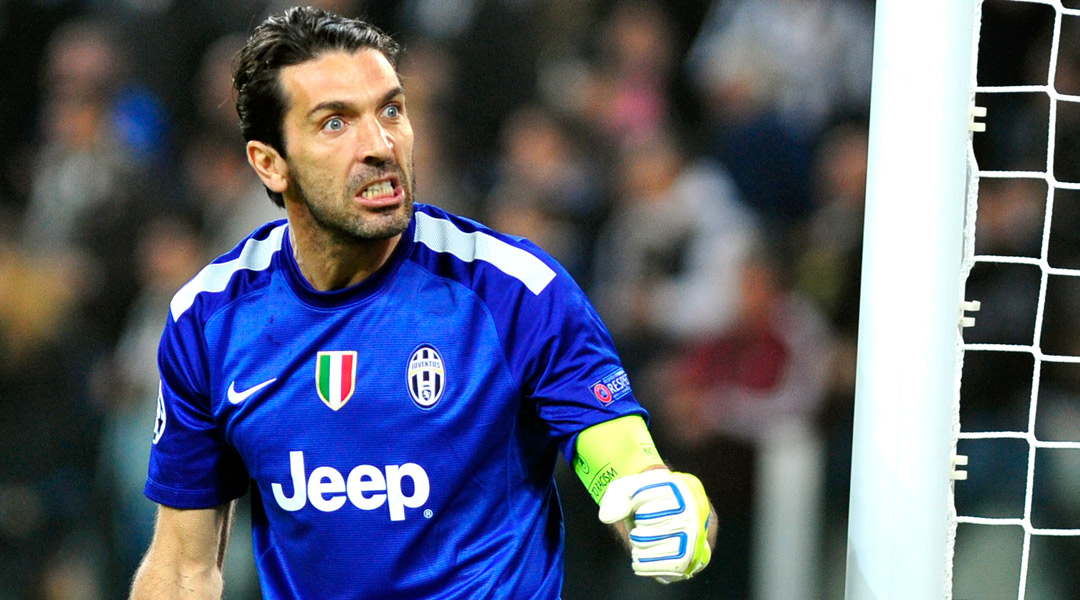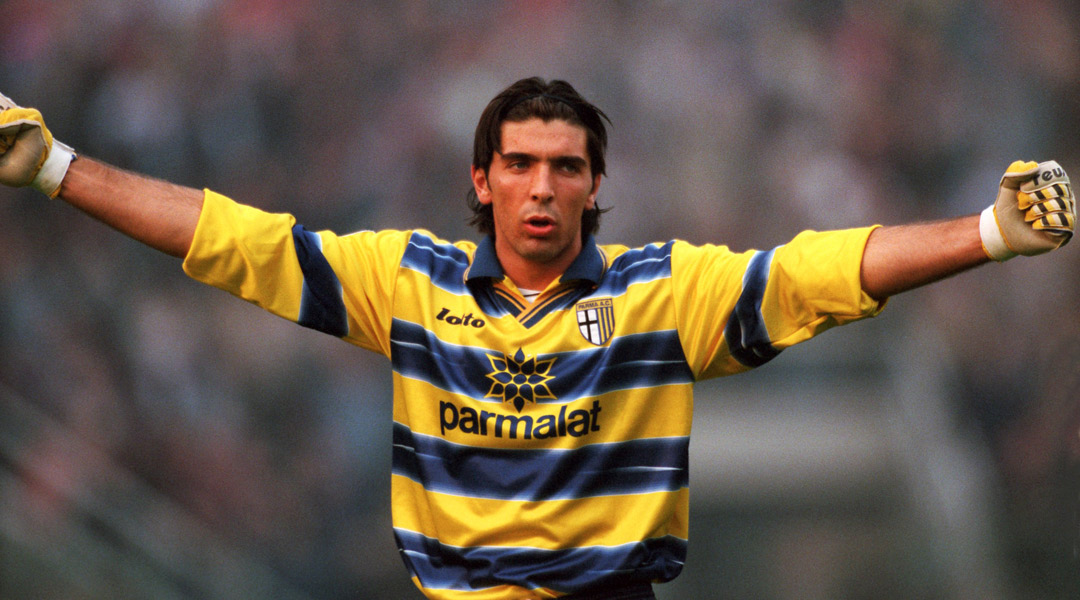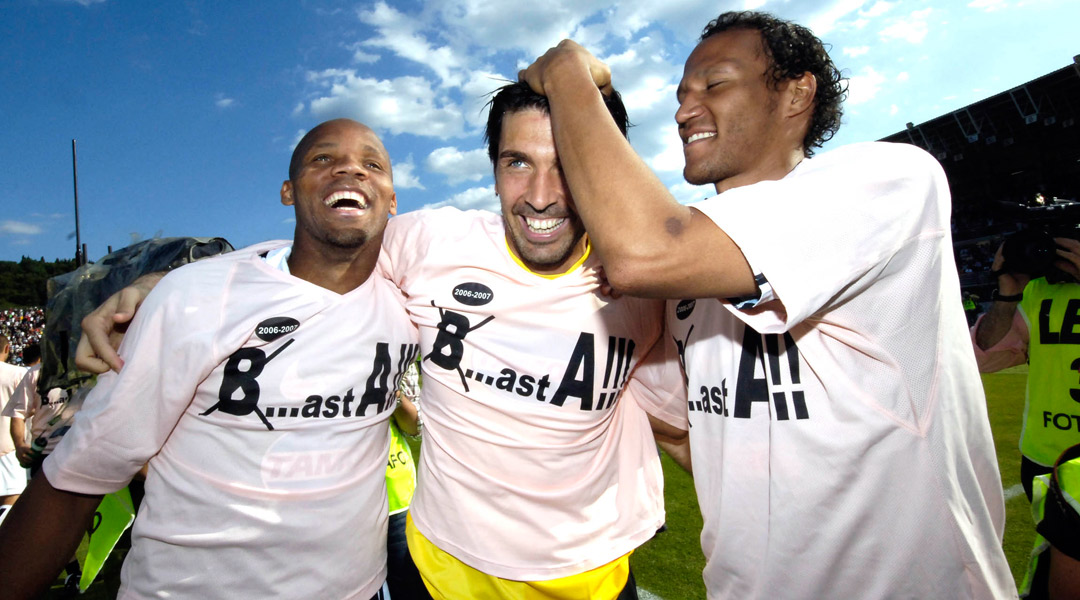Why Superman Buffon stayed at Juventus for 500 games
The Italian icon’s Juve career stretches back into a different era, says Greg Lea, but there have been times when he nearly left...

It’s strange to think that a time once existed when Gianluigi Buffon did not keep goal for Juventus.
There was no Twitter, Facebook or YouTube when Buffon made his Bianconeri debut in the 4-0 win over Venezia in August 2001, and Udinese goalkeeper Simone Scuffet had not long turned five.
Thirteen years on, Buffon has won five scudetti with the Turin giants, as well as appearing in Serie B and a Champions League final, winning the World Cup with Italy and becoming his country’s all-time record appearance maker. When Buffon takes to the field in a Juventus shirt against Genoa on Wednesday, he will be doing so for the 500th time.
Born in the coastal Tuscan city of Carrara in January 1978, Buffon began his youth career at Parma as a midfielder, before moving between the sticks after being inspired by the performances of Cameroonian stopper Thomas N’Kono at the 1990 World Cup in Italy.
Get FourFourTwo Newsletter
The best features, fun and footballing quizzes, straight to your inbox every week.
Captivated by the Indomitable Lions’ stunning victory over holders Argentina in the tournament’s opening game, Buffon admitted to falling in love with Valeri Nepomniachi’s side: “Apart from Italy, I supported Cameroon. They were my football heroes.”

A handy family
Studying the Buffon family’s sporting history, it was perhaps no coincidence that Gianluigi became a goalkeeper. His mother Maria was a discus thrower who held the Italian record for nearly 20 years, while his father Adriano represented his country at the shot put.
Lorenzo Buffon, cousin of Maria’s father, played in goal for Milan, Genoa and Inter after the Second World War, and Dante Masocco, Gianluigi’s uncle, was an Italian basketball international. When Buffon’s older sisters Veronica and Guendalina became champion volleyball players as young adults, it confirmed that the hand-related sporting gene had been passed down to the next generation, and Gianluigi’s positional alteration certainly makes perfect sense when considered within his wider familial context.
I’ve never seen a debut like his for the personality and quality he showed”
Parma reaped the rewards of Buffon’s switch, the Gialloblu’s iconic manager Nevio Scala so confident in Buffon’s ability that he handed him his debut in 1995 at the tender age of 17. The decision was brave, but not fuelled by desperation: Parma had lifted the UEFA Cup and finished third the previous year, and regular keeper Luca Bucci had just won his first caps for Italy. Buffon registered a clean sheet that afternoon against Milan, and his performance led goalkeeping legend Dino Zoff to comment that he had “never seen a debut like his for the personality and quality he showed”.
With Buffon firmly established as first choice, Parma won another UEFA Cup in 1999. The side from Emilia-Romagna also added the Coppa Italia and Supercoppa that season, and Buffon’s performances were formally recognised with his first Serie A Goalkeeper of the Year Award.
To Turin and beyond
The Tuscan collected the prize again in 2001 on the back of another remarkable season that demonstrated Buffon was no longer one for the future, but one for the here and now. Juventus clearly recognised this, forking out £33 million to bring Buffon to Turin, a fee that remains – by some distance – a world record for a goalkeeper.
The fee was unprecedented, yet few argued that it was excessive. Oliver Kahn may have been considered the world’s best keeper at the time, but Buffon was at least a close second, displaying even at 23 a variety of qualities that made him the perfect goalkeeping package.
Indeed, while Buffon – nicknamed Superman for his agility and athleticism – is certainly a fine shot-stopper, it is this completeness as a goalkeeper that really sets him apart: his positioning is superb, frequently shutting off angles and sweeping up behind his defence; his bravery is regularly displayed through fearless dives at the feet of strikers about to pull the trigger; and his organisation of his defence and sheer force of personality projects confidence throughout the team. Buffon’s all-round game is so polished, so well-developed, that it is astonishing he did not receive any formal training growing up, instead attributing everything he learnt to instinct from hours of playing freely on the streets of Carrara.
Buffon has become so synonymous with Juventus that it is easy to forget that he nearly left the Old Lady on two separate occasions. His career in Turin began brilliantly, Juventus winning Serie A in Buffon’s first two seasons and reaching the 2003 Champions League final under Marcelo Lippi, but things went downhill almost as soon as Lippi left to become Italy coach in summer 2004. Juventus disappointed in Europe under his successor Fabio Capello, and Buffon suffered a string of injuries that caused him to miss over half of the 2005/06 campaign.
Just weeks after Juventus secured the 2006 league title, however, Italian football was rocked by the Calciopoli scandal: linked with match-fixing, Juventus were stripped of their two most recent scudetti and relegated to Serie B. It was presumed that Buffon, along with fellow world-class talents Patrick Vieira, David Trezeguet and Fabio Cannavaro, would immediately head for the exit.

As it happens, the club’s demotion was exactly what kept Buffon in Turin. The goalkeeper had previously been considering a move to Milan on the grounds of wanting a new challenge, and Buffon later admitted that he would probably have accepted the Rossoneri’s offer if the authorities had not punished Juve with relegation and unwittingly given Buffon the opportunity to try something different without changing clubs.
In 2011, five years on, Roma hoped to take advantage of Buffon’s disillusionment with a perceived lack of ambition at Juventus after the Old Lady had recorded back-to-back seventh-place finishes. Buffon has since revealed that he was again tempted by the potential transfer but, upon speaking to Antonio Conte, a former team-mate and Juve’s new manager, he elected to continue his journey in Turin. Another three league titles later, Buffon’s looks a sound decision.
Iker Casillas, 692, Real Madrid, 1999–
Packie Bonner, 642, Celtic, 1978–1998
Oliver Kahn, 632, Bayern Munich, 1994–2008
Bruce Grobbelaar, 628, Liverpool 1981–1994
Sepp Maier, 623, Bayern Munich, 1962–1979
David Seaman, 564, Arsenal, 1990–2003
Alex Stepney, 539, Manchester United, 1966–1978
Victor Valdes, 535, Barcelona, 2002–2014
Peter McCloy, 535, Rangers, 1970–1986
Reaching the 500
Even for a goalkeeper, 500 games for a club as big as Juventus is a remarkable achievement. Buffon remains some way behind Juventus’s record appearance-maker Alessandro Del Piero (705), but it would be a huge surprise if he does not go on to overtake Giuseppe Furino (528) and Gaetano Scirea (552) to rise to second in the list.
Further afield, Buffon’s 500 games at a top European club places him among an elite few: in the last 20 years, only Iker Casillas (692 for Real Madrid), Oliver Kahn (632 for Bayern Munich), David Seaman (564 for Arsenal) and Victor Valdes (535 for Barcelona) have amassed more appearances for a single outfit.
Buffon’s contract with the Bianconeri runs until the end of next season, and he has spoken recently of his desire to continue until 2018, when he hopes to captain Italy at the World Cup in Russia. If he were to do so, Buffon would become the first man to ever appear in six World Cup squads, as well as the second goalkeeper to captain Italy at football’s showpiece event at the age of 40. Dino Zoff, the first, lifted the Jules Rimet trophy as the Azzurri won the 1982 tournament in Spain, and Buffon would likely give his right arm to do the same in four years’ time.
Even with an amputation, the man they call Superman would still take some beating.
Greg Lea is a freelance football journalist who's filled in wherever FourFourTwo needs him since 2014. He became a Crystal Palace fan after watching a 1-0 loss to Port Vale in 1998, and once got on the scoresheet in a primary school game against Wilfried Zaha's Whitehorse Manor (an own goal in an 8-0 defeat).

